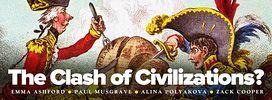Samuel Huntington’s clash of civilizations theory, as Paul Musgrave reminds us, is not a well respected academic theory. The fact that none of my co-contributors here chose to actually defend Huntington’s theory is an excellent indicator of how serious the flaws in his argument are. I’m grateful to all the contributors for their thoughtful responses to my essay, particularly for highlighting the daylight between some stances that the Trump administration has taken – notably on Russia and Asia – and Huntington’s book.
It’s also true – as Alina Polyakova notes – that it is probably premature to impute a coherent Trump Doctrine from the administration’s chaotic first few weeks in power. Indeed, while I cited the writings of Trump’s new National Security Advisor Michael Flynn in my initial essay, he has already departed after the shortest tenure of any National Security Advisor in history. While his replacement, Lt. Gen. H.R. McMaster, is far closer to the mainstream on these issues, new exposés in the media highlight that another senior Trump advisor, Sebastian Gorka, appears to share similar views to Flynn and Bannon. Meanwhile other top jobs remain unfilled, and some of Trump’s existing appointments seem increasingly to differ from him on key issues, notably Mattis and Tillerson.
Yet I would argue that even in this few short weeks in office, the new administration has taken steps on staffing and issued executive orders which imply that President Trump will bear a strong resemblance to the opinions of candidate Trump. Dissenting cabinet members thus far appear to have had little influence on policy, while the Breitbart faction, most notably Steve Bannon, appears ascendant.
And while we can all agree that Huntington doesn’t present a sound academic thesis, I believe it is still a good first cut at understanding this administration’s incipient worldview. If, as Musgrave argues, Huntington is effectively preaching to the nationalist, nativist choir, the choir is now well-positioned to play a role in policy formation.
A key theme that emerges across all the response essays are the areas where the new administration diverges from Huntington, raising the question of whether other global visions may be a more accurate representation of the Trump Doctrine. Both Polyakova and Musgrave raise the tensions between liberalism, multiculturalism, and traditionalism in this context, with the former arguing that “the great struggle facing the world [according to the Trump administration] is first and foremost an intra-civilizational struggle… between the stabilizing forces of traditionalists… and the chaotic forces of modern Western liberalism.”
Nowhere is this more evident than the Trump administration’s apparent embrace of Putin’s Russia. Where Huntington argued that a traditionalist Russia and a liberal West would conflict, the new administration appears keen to embrace Russia as an ally in the fight against terror. Rather than a clash of civilizations, therefore, perhaps the new administration’s approach can be better explained as part of a rising tide of nationalist, traditionalist movements across the world, a type of “illiberal international.”
Yet there are hints that Trump’s advisors view Russia less as an ally and more a partner of convenience. As Polyakova herself notes, Bannon has been alternately critical and praising of Putin’s government in his public remarks. Under pressure over Russian involvement in the election, Trump’s own stance towards Russia has become steadily more negative since his inauguration. And this traditionalist theory also seems to break down in regions outside Europe, in particular the Middle East. The growing numbers of personnel within the Trump administration who appear to consider Islam itself a threat to the United States – as Vox outlines here – implies that they are not advancing ideological ideals so much as cultural ones.
Asia offers another challenge to the idea that Trump’s advisors are guided by a civilizational view of the world. As Zack Cooper notes, both the Obama administration and the Bush administration attempted to conduct a pivot to the rising Asia-Pacific region, a shift driven by realist concerns about great power politics. Perhaps the Trump administration’s actions might be better explained by a classic, balance-of-power view of the world, rather than a civilizational clash.
But if Trump’s foreign policy is being driven by realpolitik, he is doing a remarkably poor impression of Bismarck. Trump has taken a massively inconsistent approach to U.S. allies in the region, such as his alternating praise and castigation of Japan. He has taken adversarial stances towards friendly nations like Australia for no apparent reason, and inexplicably questioned stabilizing policies like the One China policy. And while Cooper rightly points out that U.S. leaders seeking an Asia pivot have often been pulled into the Middle East against their will, Trump and his advisors seem determined to prioritize low-threat actors like ISIS over great power politics.
Ultimately, it is no surprise that there are inconsistencies between Huntington and Trump’s foreign policy approach; after all, Huntington’s book was published two decades ago, when Japan was a rising economic powerhouse, Russia was democratic and impoverished, and most Americans were unaware that al Qaeda existed. Huntington’s vision was even somewhat internally contradictory, arguing that the West was defined by liberal values, but advocating nativist policies that were themselves profoundly illiberal.
But while the incoming administration’s worldview is not entirely consistent with any theory of international relations or approach to grand strategy, I believe that so far Huntington’s nativist, civilizational worldview comes closest. Only time will tell for sure.

